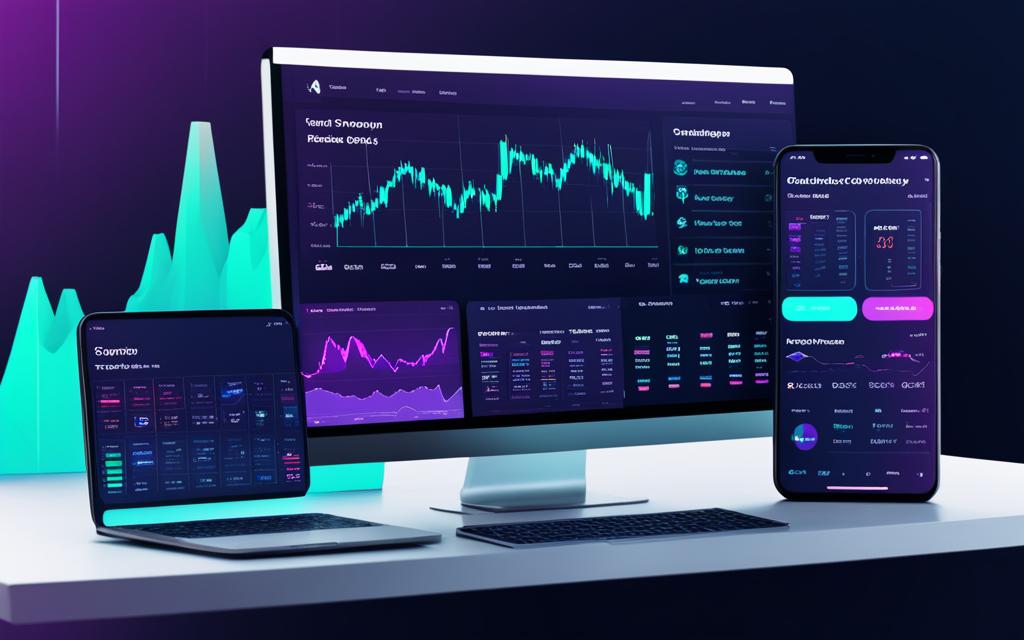Decentralized exchange platforms are a big hit for secure crypto trading recently. They let users trade crypto straight from their wallets. This cuts out the middlemen and boosts privacy.
Uniswap leads as one of the top decentralized exchanges, with a 9.4/10 rating. It’s easy to use and has lots of liquidity. For trading ERC-20 tokens on Ethereum, it’s a favorite. To dive deep into Uniswap and other leading platforms, check out this comprehensive guide.
Curve Finance is another key player with a 9.1/10 rating. It’s perfect for trading stablecoins thanks to deep liquidity and low fees. For more insights on top decentralized exchanges in 2023, see this informative article.
1inch stands out too, with a 9.1/10 rating. Known for fetching the best prices by comparing multiple exchanges, it ensures top deals. To learn more about the benefits of decentralised exchanges, go to this insightful resource.
Decentralized exchanges bring lots of perks, like lower fees than centralized ones and stronger security with smart contracts. They’re changing the way we trade crypto, drawing in both pros and beginners. Embrace the power of decentralized exchanges for your crypto dealings today!
Features to Consider in a Decentralized Exchange
When picking a decentralized exchange, keep in mind several important features. These include the type of exchange, liquidity, how easy it is to use, fees, and what cryptocurrencies it supports. This will make sure your trading goes smoothly and safely.
1. Decentralized Exchange Features
Choose a decentralized exchange with tools that give you total control of your money. Go for ones offering non-custodial wallets, smart contracts, and peer-to-peer trades. This way, you own your assets outright and sidestep the dangers of centralized power.
2. Liquidity
Liquidity is key for good trading. It means you can buy or sell quickly without affecting the price too much. High liquidity exchanges ensure quick trades and less price slippage. Aim for exchanges with lots of users and partnerships with external liquidity providers for better trading options.
3. User Interface
A good user interface makes trading stress-free. Find platforms with easy navigation, seamless interfaces, and customizable views. This will make your trading more effective and keeping an eye on your investments easier.
4. Fees
Don’t forget about the fees on a decentralized exchange. Look for those with clear and competitive pricing. Understand their charges for trades, deposits, withdrawals, and network fees. Knowing this helps you see how cost-effective your plan is and guide your choices.
5. Supported Cryptocurrencies
Make sure your exchange offers a broad mix of cryptocurrencies. The ability to invest in various tokens opens up more opportunities. Aim for exchanges that carry well-known coins like Bitcoin and Ethereum, and newer options as well.
In conclusion, when deciding on a decentralized exchange, evaluate its core features, liquidity, user-friendliness, fees, and crypto options. This will help you pick a platform that fits your trading style and goals.
| Exchange | Liquidity | User Interface | Fees | Supported Cryptocurrencies |
|---|---|---|---|---|
| Exchange X | High | User-friendly | Competitive | Bitcoin, Ethereum, Litecoin |
| Exchange Y | Medium | Customizable | Low | Bitcoin, Ethereum, Ripple, Cardano |
| Exchange Z | Low | Intuitive | No fees | Bitcoin, Ethereum, Dogecoin |
Conclusion
In the world of cryptocurrency trading, secure platforms are a must. Decentralized exchanges, like Uniswap, Curve, and 1inch, have become popular. They provide secure crypto trading and financial freedom.
Uniswap has handled $2.0T in transactions. It’s the main decentralized exchange for many chains with high liquidity and low fees. Curve tries to reduce slippage, making it great for big trades. 1inch has seen $470B in transactions. It lets users access many decentralized exchanges and liquidity pools from one place.
The trading volume of decentralized exchanges has soared. In May 2023, it was over 20% higher than that of centralized exchanges. This shows more people are moving towards decentralized finance (DeFi).
Decentralized exchanges offer a secure option against traditional exchanges. They let traders seek financial freedom in a clear and decentralized space.
For more info on top decentralized exchanges, check out https://swissmoney.com/best-decentralized-crypto-exchanges/, https://sdlccorp.com/post/what-are-the-top-10-decentralized-exchange-development-companies-in-2024/, and https://shardeum.org/blog/best-decentralized-exchanges/.
FAQ
What is a decentralized exchange?
A decentralized exchange lets people trade cryptocurrencies directly. There’s no central authority involved. It’s a secure and private way to trade digital assets.
Why choose a decentralized exchange?
Decentralized exchanges offer benefits like good liquidity, meaning buying and selling is smooth. They usually have lower fees than other exchanges. Plus, they focus on keeping user information safe and private since they don’t control your money.
Which decentralized exchanges are considered the best?
In 2024, Uniswap, Curve, and 1inch lead as top decentralized exchanges. They’re liked for being easy to use, having lots of liquidity, and charging low fees. Uniswap is especially popular, with a 9.4/10 rating from CoinLedger.
What features should I consider when choosing a decentralized exchange?
Look for an exchange with enough liquidity, which means it’s easy to trade without affecting prices much. Ensure it’s easy to use, has low fees, and supports many cryptocurrencies. This gives you lots of trading options.
Are decentralized exchanges secure?
Yes, decentralized exchanges focus on security. They don’t hold your funds, so they’re less likely to be hacked. But, it’s still important to use strong passwords, two-factor authentication, and be cautious with the tokens you trade.
How can decentralized exchanges contribute to financial freedom?
Decentralized exchanges help with financial freedom by giving direct access to cryptocurrency markets. This allows people to control their funds and transact without banks. By making it easier to enter the market, these exchanges open up financial services to everyone.



















